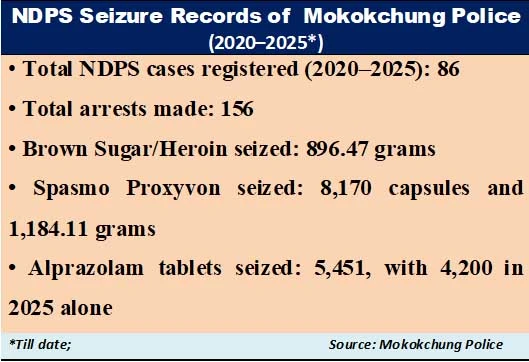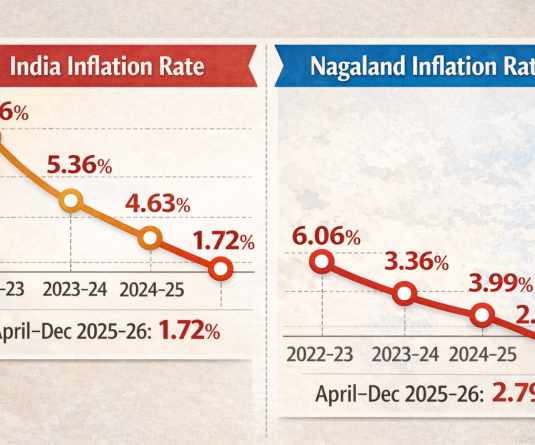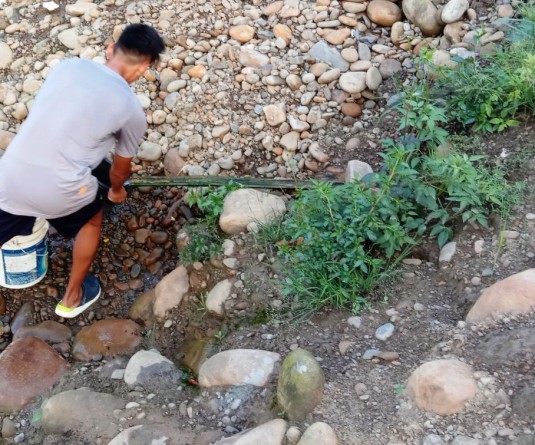View of Mokokchung town. (Morung File Photo)
.jpg)
June 26 is International Day Against Drug Abuse and Illicit Trafficking
Yarden Jamir
Mokokchung | June 25
Mokokchung district has recorded a decline in the number of drug-related cases registered under the NDPS Act in recent years, but official data revealed a surge in the quantity and potency of narcotics seized, particularly Brown Sugar (Heroin) and prescription drugs such as Spasmo Proxyvon and Alprazolam.
According to records maintained by Mokokchung Police, a total of 86 cases were registered in the district under the Narcotic Drugs and Psychotropic Substances (NDPS) Act, 1985 during the 2020–2025 period. The district police also made 156 arrests during the intervening period.
Meanwhile, seizure of Brown Sugar/Heroin stood at 896.47 grams, while Spasmo Proxyvon accounted for 8,170 capsules and 1,184.11 grams. A total of 5451 Alprazolam tablets were seized during the 2020–2025 period, with 4200 in 2025 alone.
As per the police’s records, 2023 marked the peak in enforcement with 32 cases and 77 arrests. It declined to 11 in 2024 and further to 5 in 2025 till June.
However, with just 5 cases so far, 2025 has already seen higher seizures of certain substances. Brown Sugar seizures in 2025, at 182.61g, are more than triple that of 2024 (54.52g), while Alprazolam tablet seizures jumped from a mere 50 in 2024 to 4200 in 2025.

Speaking to The Morung Express, the Additional Superintendent of Police (ASP) and PRO, Mokokchung, Y Tumchobemo Yanthan clarified that “Shan flower,” often misquoted as “Sunflower,” refers to Brown Sugar (Heroin) linked to opium production in Myanmar’s Shan State.
“We have tested some of the samples and found them to be 70%–80% pure—even up to 90% in some cases,” he said.
Besides heroin, Spasmo Proxyvon (SP) remains the most commonly seized prescription drug. In 2023, the highest capsule seizure of 2,951 was recorded, while in 2024, seizures shifted to bulk powder form, totaling 1,184.11 grams.
Further, Alprazolam, a psychiatric drug with sedative properties, saw a dramatic spike in seizures this year. Cough syrups like Apcorex and Novocoff-CT have also appeared in multiple seizures.
Yanthan confirmed that the majority of those involved in drug-related offenses are between the ages of 20 and 40, with some even in their 50s.
Around 1400 persons in OST therapy
The PRO also revealed that approximately 1,400 individuals in the district are currently undergoing Opioid Substitution Therapy (OST), with some users continuing treatment for up to 10 years, often without regulatory oversight.
“There are even cases where OST medicines are being mixed with Brown Sugar, which defeats the purpose of treatment,” he maintained.
While drug-related crimes like theft remain less visible in Mokokchung compared to other districts, the PRO stated that such incidents might have occurred, but no reports or FIRs have been registered in local police stations so far.
Often, the stigma associated with drug use deters families from seeking help or filing complaints. “Society here is still not open about drug problems. Families fear being judged. But this silence makes enforcement harder,” he said, adding that informants are kept confidential and urged the public to support police efforts.
Enforcement drive
The district’s Anti-Narcotic Task Force (ANTF), headed by the ASP, includes the Sub-Divisional Police Officer (SDPO) and Officer-in-Charge from all police stations. The task force meets monthly to monitor developments and coordinate operations.
Most drugs entering Mokokchung come from Dimapur and some bordering areas of Assam, while SP tablets are often sourced from Zunheboto, the PRO added.
Currently, it was learnt that the district has only two Non-Governmental Organisation (NGO)-run rehabilitation facilities—one in Akhoya and the other in Tuli. However, neither is a full-fledged or fully equipped centre and both lack government support and certification.
The police emphasised the urgent need for policy-level intervention to establish well-equipped and regulated rehabilitation centres. While the PRO stated that the police are conducting public awareness and prevention campaigns and holding meetings with civil society groups and village councils, he also urged NGOs and civil society organisations to assist by reporting drug abuse to the nearest police station.
“Without public cooperation, it is difficult to go on a war footing and make a real breakthrough,” Yanthan said.
Mokokchung Police maintain a zero-tolerance policy, but officials say enforcement alone will not be enough without broader community engagement.





